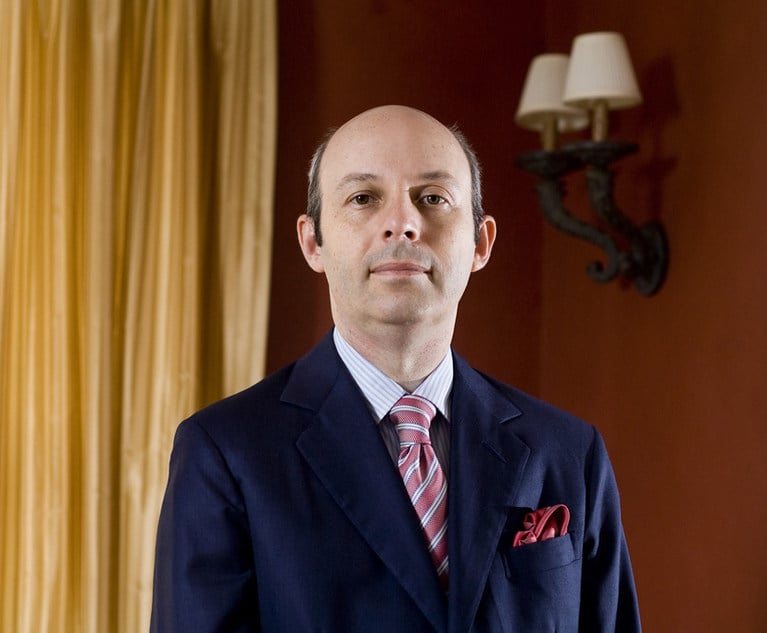 Photo: Janos Rautonen/Shutterstock.com.
Photo: Janos Rautonen/Shutterstock.com. Parkland Jurors Must Manage Trial Stress on Their Own
They will view graphic security video of terrified teens and teachers being shot point-blank or running for their lives, examine autopsy and crime scene photos and hear heartrending testimony from wounded survivors and family members of the murder victims.
July 05, 2022 at 10:19 AM
6 minute read
The jurors chosen this past week to decide whether Florida school shooter Nikolas Cruz is executed will visit a bloodstained crime scene, view graphic photos and videos and listen to intense emotional testimony — an experience that they will have to manage entirely on their own.
Throughout what is expected to be a monthslong penalty trial, Circuit Judge Elizabeth Scherer will order jurors not to talk to anyone about what they have seen, heard or thought. Not their spouse. Not their best friend. Not their clergy or therapist. Not even each other until deliberations begin. The order is not unusual; it is issued at all trials to ensure jurors' opinions aren't influenced by outsiders.
Once the trial ends, the 12 jurors and 10 alternates can unload to others — but they won't receive any assistance from the judicial system. As is the case in most of the United States, neither Florida nor Broward County courts provide juries with post-trial counseling.
The only state to do so is Massachusetts, which has only offered the service since December. Since 2005, federal courts have offered assistance after about 20 trials annually, usually those involving the death penalty, child pornography and child abuse cases, said federal court system spokesman Charles Hall.
"Judges and jurors alike appreciate" the program, Hall said, "viewing it as an acknowledgment of the extraordinary stresses that jury service in certain types of trials can entail."
"That said, the program is not well-used," Hall added.
The Cruz jurors will tour the now-abandoned three-story building at Marjory Stoneman Douglas High School in Parkland where Cruz, 23, fatally shot 14 students and three staff members and wounded 17. Its bullet-pocked halls remain unchanged since shortly after the Feb. 14, 2018, massacre, with Valentine's Day gifts still strewn about.
They will view graphic security video of terrified teens and teachers being shot point-blank or running for their lives, examine autopsy and crime scene photos and hear heartrending testimony from wounded survivors and family members of the murder victims. When it is over, the jurors will grapple with the weighty decision of whether a young adult — even someone responsible for one of the worst slaughters in the nation's history — should live or die.
"It's going to be horrible," Cruz's lead attorney, Melisa McNeill, recently warned one potential juror in court.
Jim Wolfcale was foreman of the Virginia jury that convicted Lee Boyd Malvo for his role in one of the multiple deaths that resulted in 2002 from a series of sniper shootings in Washington, D.C.
Wolfcale said he sometimes found it difficult not to talk to other jurors, particularly after Malvo appeared "disrespectful or arrogant" during testimony.
"I would be like, 'You've got to be kidding me,' so it would be hard not to talk about. I would wonder, 'Am I thinking right? Are the other guys and girls on the jury thinking what I am thinking?'" said Wolfcale, a minister. But outside court, his wife and friends never asked about the case, knowing he couldn't talk. "My friends would just say, 'We're praying for you.'"
Malvo, in his teens like Cruz, admitted in court to killing 17 people. Unlike Cruz, he committed the slayings over nine months in multiple states.
Cruz pleaded guilty in October to 17 counts of first-degree murder, but is challenging his death penalty trial. For him to receive a death sentence, all jurors must agree. Otherwise, the former Stoneman Douglas student will receive life without parole.
For all or most of Cruz's jurors, this will undoubtedly be their first exposure to graphic gun violence and they will be dealing with the deadliest mass shooting that has ever gone to trial in the U.S. Nine other people in the U.S. who fatally shot at least 17 people died during or immediately after their attacks. The suspect in the 2019 massacre of 23 at an El Paso, Texas, Walmart is awaiting trial.
Wolfcale said that during the Malvo trial, other jurors sometimes broke down in the jury room after seeing graphic evidence or hearing emotional testimony. They would hug, and divert themselves by talking about the upcoming Christmas holidays. Malvo ultimately received a life sentence instead of the death penalty because the jury was split, partly because of the defendant's young age.
Wolfcale — who voted to execute Malvo — said he didn't feel stress until late on the trial's final day. Then, he said, "It hit me" — and stayed with him for months.
"Even today, 20 years later, when your adrenaline is high, you can recall a lot, but that first six months it was on my mind constantly," he said.
Responding to a survey conducted by the Center for Jury Studies, 70% of questioned jurors said they experienced stress during routine trials, according to center director Paula Hannaford-Agor. She said 10% reported severe stress, though that usually abated quickly.
In contrast, about 10% of jurors who served on high-profile, graphic trials reported long-term stress, Hannaford-Agor said. They displayed post-traumatic stress disorder symptoms similar to those exhibited by some police officers, firefighters and emergency room doctors, she said. The difference is that the first-responders can talk to colleagues, friends and counselors in real time, while the stress is building.
"Jurors, of course, are told they are not allowed to talk about any of it" until the trial is over, Hannaford-Agor said.
Studies also show many jurors who imposed a death sentence question themselves long after the trial.
"None of those said this was something that had completely derailed their lives, but … years later they were still thinking about it and wondering if they made the right decision, and remember how difficult that decision was," Hannaford-Agor said.
On their own, jurors 65 and older can get mental health services through Medicare. Younger jurors may have coverage through jobs or private insurance, but that sometimes requires co-pays and deductibles running into thousands of dollars. That could deter many.
In addition to the cost factor, courts don't offer programs because judges and other officials have experience processing graphic evidence and can talk to others during the trial, Hannaford-Agor said. They might not fully appreciate jurors' stress levels.
Judges "aren't feeling it quite as intensely," she said.
Associated Press researcher Jennifer Farrar in New York contributed to this report.
NOT FOR REPRINT
© 2025 ALM Global, LLC, All Rights Reserved. Request academic re-use from www.copyright.com. All other uses, submit a request to [email protected]. For more information visit Asset & Logo Licensing.
You Might Like
View All
US Judge Cannon Blocks DOJ From Releasing Final Report in Trump Documents Probe
3 minute read
SCOTUSblog Co-Founder Tom Goldstein Misused Law Firm Funds, According to Federal Indictment
2 minute read
Automaker Pleads Guilty and Agrees to $1.6 Billion in Payouts

Read the Document: DOJ Releases Ex-Special Counsel's Report Explaining Trump Prosecutions
3 minute readTrending Stories
- 1Uber Files RICO Suit Against Plaintiff-Side Firms Alleging Fraudulent Injury Claims
- 2The Law Firm Disrupted: Scrutinizing the Elephant More Than the Mouse
- 3Inherent Diminished Value Damages Unavailable to 3rd-Party Claimants, Court Says
- 4Pa. Defense Firm Sued by Client Over Ex-Eagles Player's $43.5M Med Mal Win
- 5Losses Mount at Morris Manning, but Departing Ex-Chair Stays Bullish About His Old Firm's Future
Who Got The Work
J. Brugh Lower of Gibbons has entered an appearance for industrial equipment supplier Devco Corporation in a pending trademark infringement lawsuit. The suit, accusing the defendant of selling knock-off Graco products, was filed Dec. 18 in New Jersey District Court by Rivkin Radler on behalf of Graco Inc. and Graco Minnesota. The case, assigned to U.S. District Judge Zahid N. Quraishi, is 3:24-cv-11294, Graco Inc. et al v. Devco Corporation.
Who Got The Work
Rebecca Maller-Stein and Kent A. Yalowitz of Arnold & Porter Kaye Scholer have entered their appearances for Hanaco Venture Capital and its executives, Lior Prosor and David Frankel, in a pending securities lawsuit. The action, filed on Dec. 24 in New York Southern District Court by Zell, Aron & Co. on behalf of Goldeneye Advisors, accuses the defendants of negligently and fraudulently managing the plaintiff's $1 million investment. The case, assigned to U.S. District Judge Vernon S. Broderick, is 1:24-cv-09918, Goldeneye Advisors, LLC v. Hanaco Venture Capital, Ltd. et al.
Who Got The Work
Attorneys from A&O Shearman has stepped in as defense counsel for Toronto-Dominion Bank and other defendants in a pending securities class action. The suit, filed Dec. 11 in New York Southern District Court by Bleichmar Fonti & Auld, accuses the defendants of concealing the bank's 'pervasive' deficiencies in regards to its compliance with the Bank Secrecy Act and the quality of its anti-money laundering controls. The case, assigned to U.S. District Judge Arun Subramanian, is 1:24-cv-09445, Gonzalez v. The Toronto-Dominion Bank et al.
Who Got The Work
Crown Castle International, a Pennsylvania company providing shared communications infrastructure, has turned to Luke D. Wolf of Gordon Rees Scully Mansukhani to fend off a pending breach-of-contract lawsuit. The court action, filed Nov. 25 in Michigan Eastern District Court by Hooper Hathaway PC on behalf of The Town Residences LLC, accuses Crown Castle of failing to transfer approximately $30,000 in utility payments from T-Mobile in breach of a roof-top lease and assignment agreement. The case, assigned to U.S. District Judge Susan K. Declercq, is 2:24-cv-13131, The Town Residences LLC v. T-Mobile US, Inc. et al.
Who Got The Work
Wilfred P. Coronato and Daniel M. Schwartz of McCarter & English have stepped in as defense counsel to Electrolux Home Products Inc. in a pending product liability lawsuit. The court action, filed Nov. 26 in New York Eastern District Court by Poulos Lopiccolo PC and Nagel Rice LLP on behalf of David Stern, alleges that the defendant's refrigerators’ drawers and shelving repeatedly break and fall apart within months after purchase. The case, assigned to U.S. District Judge Joan M. Azrack, is 2:24-cv-08204, Stern v. Electrolux Home Products, Inc.
Featured Firms
Law Offices of Gary Martin Hays & Associates, P.C.
(470) 294-1674
Law Offices of Mark E. Salomone
(857) 444-6468
Smith & Hassler
(713) 739-1250






